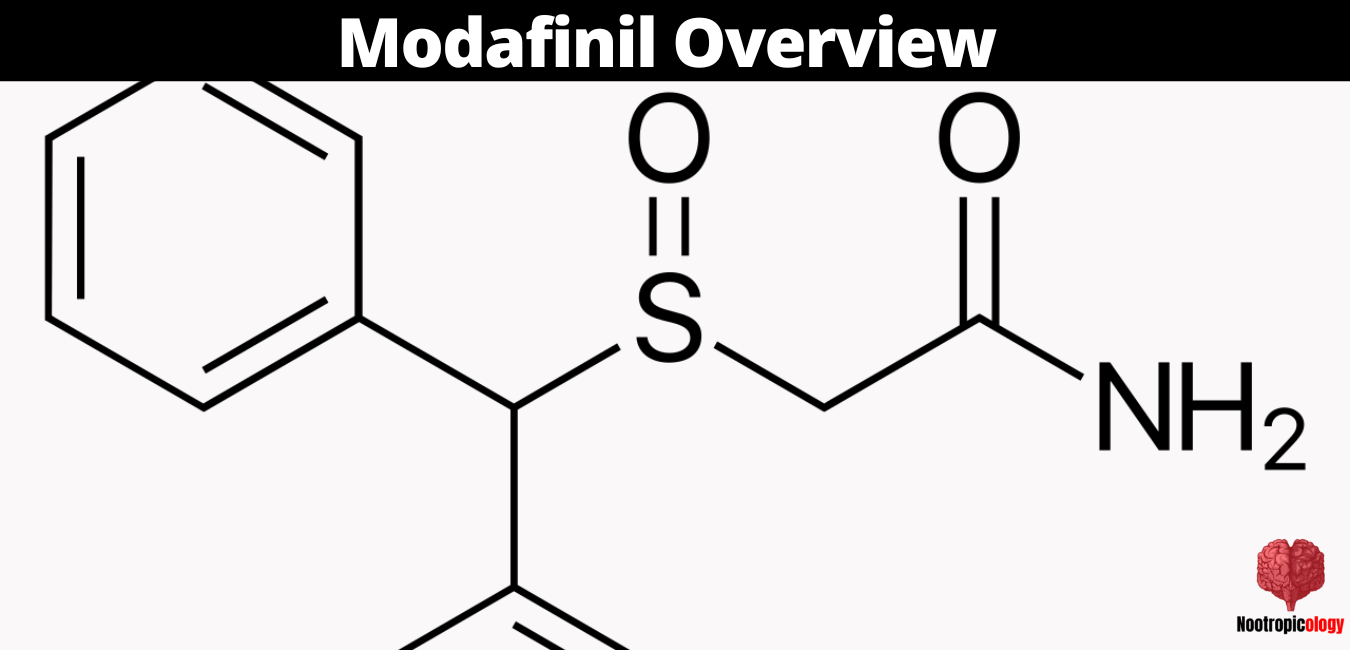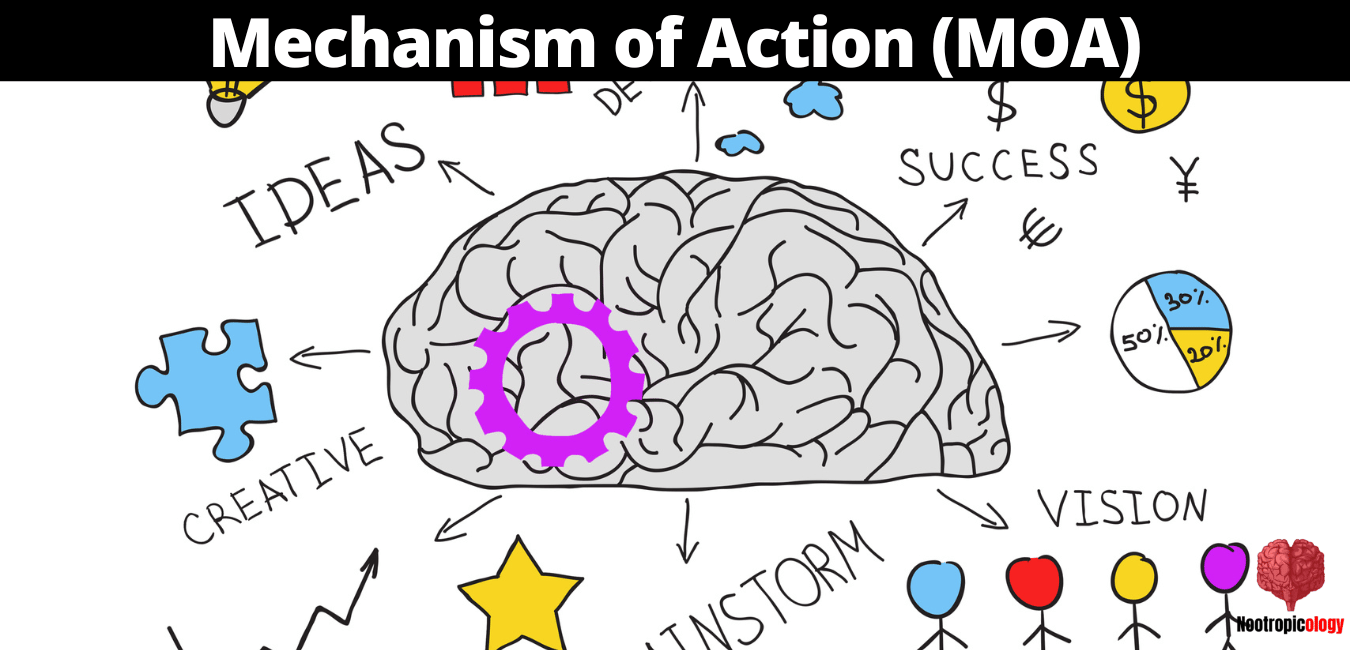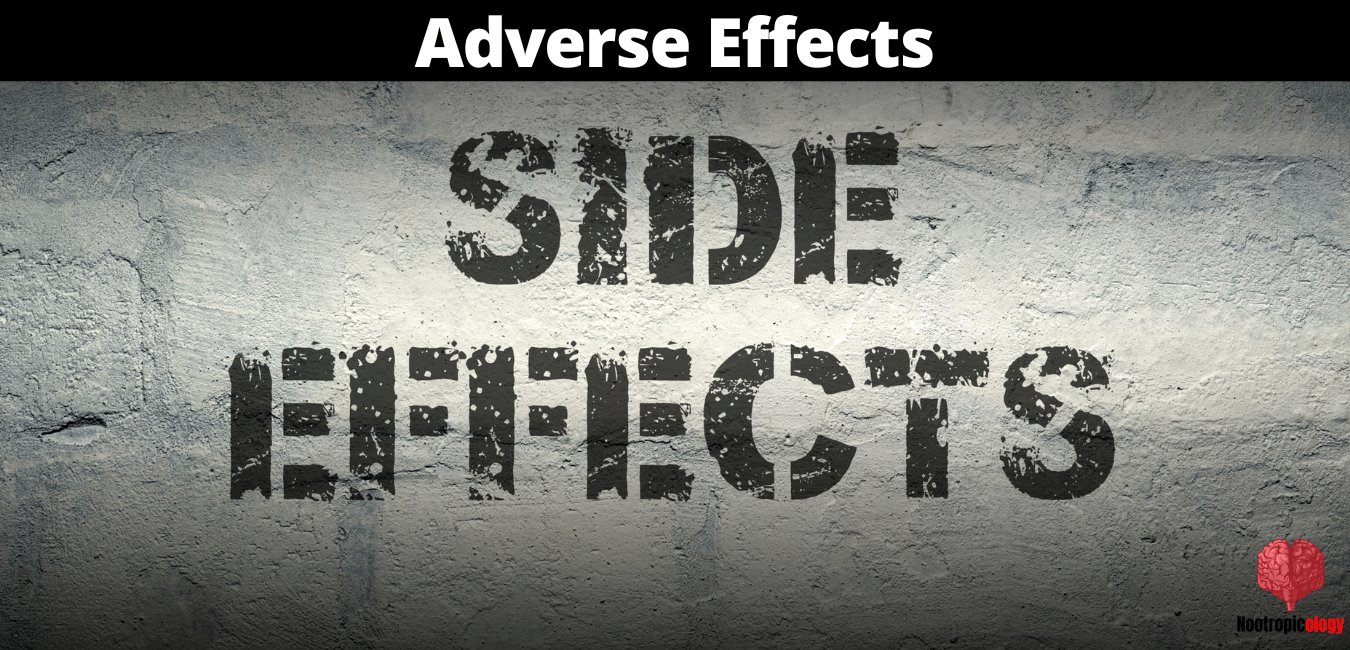Modafinil (Provigil) Nootropic Review: Dosage, Benefits & Side Effects
Modafinil (Provigil, CRL-40476), a psychostimulant and eugeroic agent, has garnered significant attention due to its potential to treat sleep disorders and enhance cognitive performance.
This article aims to provide a comprehensive review of Modafinil's pharmacology, mechanisms of action, and clinical applications, with an emphasis on scientific evidence and information.
So, let's take a deep dive into the science behind Modafinil and see how it works.
Overview of Modafinil as a Psychostimulant


Modafinil (2-[(diphenylmethyl) sulfinyl]acetamide) is a synthetic compound belonging to the benzhydryl sulfinylacetamide class of drugs. It is commonly sold under the brand names: Provigil, Alertec, and Modavigil.
Initially developed in the 1970s by Lafon Laboratories and neuroscientist Michel Jouvet, in France, Modafinil has since been approved by the Food and Drug Administration (FDA) and other regulatory agencies worldwide for the treatment of specific sleep disorders.
Its unique pharmacodynamic profile sets it apart from traditional psychostimulants, such as amphetamines and methylphenidate, by offering similar therapeutic benefits with fewer side effects and a lower propensity for abuse.
It works by stimulating the release of dopamine, norepinephrine, serotonin, and orexin in key areas of the brain. These neurotransmitters are all responsible for producing positive effects on mood, increasing focus, reducing fatigue, enhance memory formation and recall.
In 2020, Modafinil was the 302nd most commonly prescribed medication in the United States, with just over 1,000,000 prescriptions.[1]
Chemical Structure and Pharmacokinetics of Modafinil
Before we dive into understanding Modafinil, it is important to understand its chemical structure and pharmacokinetics.
Chemical Properties and Classification
Modafinil's chemical structure consists of a diphenylmethyl sulfinylacetamide moiety, which contributes to its distinctive pharmacological properties. The sulfinyl group plays a crucial role in its activity, and the chirality at the sulfur atom gives rise to two enantiomers, the R-(−)- and S-(+)-enantiomers.[2]
The racemic mixture (1:1) of these enantiomers is used clinically, although the R-enantiomer is thought to have a longer half-life and greater potency.
Routes of Administration and Absorption
Oral administration is the primary route for Modafinil, typically in the form of tablets. The compound is lipophilic, meaning it's able to dissolve, be dissolved in, or absorb lipids (fats), enabling it to readily cross the blood-brain barrier (BBB) and achieve adequate central nervous system (CNS) penetration.
Modafinil exhibits dose-linear pharmacokinetics within the therapeutically relevant dose range, with peak plasma concentrations achieved approximately 4-6 hours post-ingestion. Dose-linearity refers to the fact that there are no clear changes in pharmacokinetic parameters as the dose is increased.
Metabolism and Elimination
As with other CNS drugs, Modafinil has a large volume of distribution (Vd - ~0.9 L/kg), indicating its tendency to become widely distributed throughout the body's tissues and fluids. The drug is also highly bound to plasma proteins.[3]
Modafinil has good oral absorption and bioavailability, with a large fraction of the dose being absorbed in the gastrointestinal tract once ingested. It then passes through the liver on its way to the bloodstream, where it is distributed throughout the body.
The primary route of Modafinil metabolism occurs in the liver via the cytochrome P450 (CYP) enzyme system, predominantly through CYP3A4 and, to a lesser extent, CYP2C19. The primary metabolic products are the inactive Modafinil acid and Modafinil sulfone. Modafinil and its metabolites are primarily eliminated via renal excretion, with approximately 80% excreted in the urine and the remainder in the feces.[4]
Modafinil's Bioavailability and Half-life
Modafinil exhibits a bioavailability of approximately 62.3%, with food having minimal to no effect on its absorption. The drug's elimination half-life ranges from 12 to 15 hours, depending on factors such as age, hepatic function, and CYP2D6 genotype. The R-enantiomer (Armodafinil, Nuvigil) exhibits a longer half-life (15-18 hours) compared to the S-enantiomer (4-5 hours).[5]
Modafinil's Mechanism of Action and Neuropharmacology


Modafinil's precise mechanism of action remains incompletely understood. However, it is known to modulate several neurotransmitter systems, including:
- Dopaminergic
- Noradrenergic
- Serotonergic
- Orexinergic
- Glutamatergic
- GABAergic
- Histaminergic and cholinergic systems
These interactions ultimately contribute to the drug's ability to promote wakefulness and enhance various cognitive functions. Modafinil has been shown to increase dopamine release in the prefrontal cortex and nucleus accumbens via DAT blockade as a vigilance-promoting agent in clinical settings.[6]
Modafinil is also known to reduce glutamate release in the hypothalamus, which is associated with wakefulness.[7] Furthermore, its interactions with noradrenergic systems allow it to improve attention and executive functions. In addition, it increases the release of dopamine in the prefrontal cortex and nucleus accumbens through DAT blockade, making it a viable vigilance-promoting agent for clinical settings.
Involvement of Neurotransmitter Systems
Now that we have better understood Modafinil's neural mechanisms let us focus on the involvement of the neurotransmitter systems during its action.
- Dopaminergic system: Modafinil has the ability to increase the levels of dopamine outside of cells by binding to the dopamine transporter, which makes it a mild inhibitor of dopamine reuptake and leads to increased alertness and improved cognitive abilities. It is also possible that modafinil indirectly affects the activity of D1 and D2 dopamine receptors. Still, the exact mechanism is not yet fully understood.[8]
- Noradrenergic system: Modafinil stimulates the release of norepinephrine, leading to the activation of α1 adrenergic receptors in the prefrontal cortex. This action is thought to play a role in the drug's attention-enhancing and arousal effects.[9]
- Serotonergic system (Modulation of 5-HT receptors): Modafinil interacts with various serotonin (5-HT) receptors, including 5-HT2A, 5-HT2C, and 5-HT6, potentially influencing mood and cognitive processes.[10]
- Orexinergic system (Activation of orexin receptors): Modafinil stimulates the release of orexins (hypocretins), neuropeptides that play a crucial role in regulating arousal, wakefulness, and appetite.[11] Activation of orexin receptors contributes to the drug's wake-promoting effects. The orexinergic system plays a crucial role in keeping us awake and alert. Modafinil's effect on arousal and wakefulness is mainly due to this system. When there are problems with orexin signaling, it can lead to conditions like narcolepsy and other sleep disorders.
Modulation of Glutamatergic and Gabaergic Systems
Modafinil is known to influence the balance between excitatory glutamatergic and inhibitory GABAergic neurotransmission. It increases glutamate release in select brain regions while reducing GABA release, leading to increased neuronal activity and arousal.
These brain regions, including the hypothalamus, hippocampus, and thalamus, are responsible for regulating arousal, alertness, and reward. Modafinil's effect on these regions can lead to improved wakefulness and focus.
Interaction With Histaminergic and Cholinergic Systems
Modafinil also affects histaminergic and cholinergic neurotransmission, although the extent of these interactions is less well-defined. It enhances histamine release, contributes to wakefulness, and modulates cholinergic signaling, potentially impacting cognitive functions such as memory and attention.
Cholinergic signaling is essential for learning and memory, and Modafinil has been found to have an impact on the functioning of this system. Hence, why Modafinil is being used off-label as a nootropic agent in humans by increasing acetylcholine levels (ACh) in the brain.
Comparing Modafinil to Traditional Stimulants
While Modafinil shares some similarities with traditional psychostimulants like amphetamines and methylphenidate, its unique pharmacological profile sets it apart. Its lower affinity for dopamine transporters, coupled with its multi-target mechanism of action, results in a more subtle and targeted effect on arousal and cognition.
This profile translates to a reduced incidence of side effects and a lower abuse potential compared to traditional stimulants.
Modafinil's Clinical Applications, Dosages, Benefits, and Efficacy


Using Modafinil in a clinical setting is becoming increasingly popular. Its wakefulness-promoting effects are primarily used to help manage narcolepsy and sleep problems associated with shift work. However, it has also shown some promise in the treatment of ADHD and cognitive deficits resulting from conditions such as Alzheimer’s Disease (AD).[12]
Let's take a closer look at the most common uses of Modafinil below.
How Does Modafinil Work in Narcolepsy?
Clinical trials and outcomes: Several clinical trials have demonstrated Modafinil's efficacy in reducing excessive daytime sleepiness and improving wakefulness in patients with narcolepsy. The drug is considered a first-line treatment for this condition.[13]
Modafinil effectively reduces excessive daytime sleepiness in narcolepsy patients. Although it can help with other symptoms of narcolepsy, such as excessive daytime sleepiness, it has limited effectiveness on cataplexy. Cataplexy is a physical trait of narcolepsy that involves sudden and temporary muscle weakness caused by strong emotions.
The typical starting dose for Modafinil in treating narcolepsy is 200 mg per day, taken orally once in the morning. In some cases, the dose can be increased to a maximum of 400 mg per day based on individual response and tolerability.
Obstructive Sleep Apnea (OSA)
Modafinil is used as an adjunct to Continuous positive airway pressure (CPAP) treatment for obstructive sleep apnea, particularly in cases where patients experience residual daytime sleepiness despite optimal CPAP usage.[14]
Clinical trials have shown that Modafinil can significantly improve daytime alertness and reduce excessive daytime sleepiness in patients with obstructive sleep apnea. The recommended dosage for treating excessive daytime sleepiness associated with obstructive sleep apnea is 200 mg per day, taken orally once in the morning. Modafinil is used as an adjunct to primary treatment with continuous positive airway pressure (CPAP).
Shift Work Sleep Disorder (SWSD/SWD)
Modafinil has been shown to reduce sleep latency and improve sleep quality in shift workers, helping them adapt to irregular sleep schedules.[15]
Clinical studies have also demonstrated that Modafinil can effectively maintain alertness and cognitive performance during night shifts, reducing the risk of sleepiness-related accidents and errors.[16]
For individuals with shift work sleep disorder, the typical dosage of Modafinil is 200 mg taken orally once a day, approximately 1 hour before the start of the work shift.
How Does Modafinil Work in Cognitive Enhancement?
Modafinil enhances working memory performance in healthy individuals and patients with cognitive impairments, particularly under sleep deprivation or cognitive fatigue conditions.
Modafinil also improves cognitive flexibility, allowing individuals to adapt more effectively to changing task demands or problem-solving requirements. Some evidence suggests that Modafinil can enhance inhibitory control, reducing impulsive behavior and improving decision-making.
Most biohackers take anywhere from 200-400 mg of Modafinil once or twice daily, with the optimal effect coming from taking it approximately 1 hour before the start of their work shift. It is important to keep in mind that the effects of Modafinil are dose-dependent and that higher doses will not necessarily yield better results.
ADHD
As I mentioned above, Modafinil reduces impulsive behavior, making it a useful tool for treating attention-deficit/hyperactivity disorders (ADHD). In both humans and rodents, Modafinil has been found to reduce choice impulsivity while increasing motor activity[17]
In children with ADHD, Modafinil is particularly beneficial in improving attention and reducing impulsive behavior.[18]
In off-label use for ADHD, the dosage of Modafinil is typically between 100 mg and 200 mg per day, taken orally in the morning. However, this is not an FDA-approved indication, and usage should be determined by a healthcare professional.
Depression
Modafinil has been studied as an adjunctive treatment for depression, particularly in cases where patients experience cognitive deficits or residual fatigue.
Some studies have also demonstrated that Modafinil can improve cognitive performance and reduce fatigue in patients with Major Depressive Disorder (MDD).[19]
As an adjunct treatment for depression, the dosage of Modafinil can range from 100 mg to 200 mg per day, taken orally in the morning. Again, this is an off-label use, and the actual dosage should be determined by a healthcare professional.
Myalgic Encephalomyelitis/Chronic Fatigue Syndrome (ME/CFS)
Although Modafinil hasn't specifically been studied in ME/CFS, one study looked at the efficacy and safety of Modafinil (Provigil®) for the treatment of fatigue in 72 patients with Multiple Sclerosis (MS).[20]
In patients with MS, Rammohan K W et al. discovered that taking 200 mg/day of Modafinil improved fatigue to a significant extent and was easily tolerated. This also makes it an interesting potential therapy for ME/CFS patients.
While there is limited clinical evidence for Modafinil's use in chronic fatigue syndrome, dosages in studies have typically ranged from 100 mg to 200 mg per day, taken orally in the morning. This is another off-label use, and the appropriate dosage should be determined by a healthcare professional.
Modafinil Safety Profile and Adverse Effects (Risks)


Modafinil's most common side effects include headache, nausea, dry mouth, and insomnia. These symptoms are generally mild and can often be managed with dose adjustments or symptomatic treatments.
The more serious but rare side effects of Modafinil include:
- Cardiovascular risks: Modafinil has been associated with rare but potentially serious cardiovascular events, such as hypertension and tachycardia. Patients with a history of cardiovascular disease or risk factors should be closely monitored while taking Modafinil.
- Dermatological reactions: In rare cases, Modafinil has been linked to serious dermatological reactions, including Stevens-Johnson syndrome (SJS) and toxic epidermal necrolysis. Patients experiencing a rash, blistering, or other skin reactions while taking Modafinil should seek medical attention immediately.[21]
- Psychiatric symptoms: Modafinil can occasionally cause or exacerbate psychiatric symptoms, such as anxiety, agitation, and hallucinations. It is contraindicated in patients with a history of psychosis or severe anxiety disorders.
- Tolerance, dependence, and addiction potential: Modafinil has a lower potential for abuse and addiction compared to traditional stimulants. However, long-term use can develop tolerance and dependence, particularly at high doses (400 mg and above). Regular monitoring and appropriate dose adjustments can help minimize these risks.
- Drug interactions and contraindications: Modafinil can interact with various medications, including hormonal contraceptives, anticoagulants, and other drugs metabolized by the CYP3A4 enzyme system. Patients should inform their healthcare providers of all concurrent medications to minimize the risk of adverse interactions.
When consuming alcohol, one should exercise caution, as it may interact with Modafinil, increasing the risk of dizziness or other side effects. Furthermore, following the prescribed directions for dosage and usage is crucial in order to avoid an overdose.
Adults using birth control should consult their healthcare provider for advice, as Modafinil may reduce the effectiveness of some hormonal contraceptives. In some cases, users have reported chest pain, which warrants immediate medical attention. Individuals with a history of mania or bipolar disorder should be cautious when using Modafinil, as it may exacerbate their symptoms.
As with all medicines, proper storage is essential. Keep Modafinil in a place at room temperature, away from moisture and heat, to maintain its efficacy. If you experience swelling of the face, throat, tongue, hives, or difficulty breathing, seek emergency medical help, as these could be signs of an allergic reaction.
It is crucial to monitor the data on side effects and report any unusual symptoms to your healthcare provider. The number of reported side effects may vary, but being vigilant about potential complications helps ensure your safety.
It's important to remember that Modafinil is not an inhibition-free solution; practicing self-discipline and responsible use is key to reaping its benefits without experiencing adverse effects.
My Personal Modafinil Experience & Results (Review/Rating)
I initially ordered Modafinil from Modafinilxl about 2 months ago and have since made a few additional purchases.
One of the things that really drew me to Modafinilxl.com when searching for a reputable vendor was that they have 2000+ reviews on Trustpilot as well as a money-back guarantee.
This means that if you order Modafinil from them and aren't satisfied in any way with your purchase, you can contact them and they will give you your money back.
Some of the things that I was worried about were not only the legitimacy of the company but also the quality of their Modafinil (I will discuss this later on).
I took a chance and ordered $69 worth of Modafinil and Armodafinil.
Fast Shipping


The shipping was super fast and the goods were delivered to my doorstep within 6 days.
Looking at the package I could see that they shipped from the UK which explains the fast delivery time (I live in Europe).
I have had no issues with my purchase whatsoever.
The only downside is that it can be a bit complicated sometimes to order from them if you don't use bitcoin.
The Quality of ModafinilXL
After receiving my package I immediately took 100mg (I split one 200mg tablet into 2).
After 45 minutes I could definitely feel that something was going on and I decided to take the rest of the dosage (200 mg in total) with a cup of coffee.


The effects I got from that combination were amazing, to say the least. The focus, clear-headedness, feeling energetic, and productivity I got from taking Modafinil and caffeine are like nothing I have ever experienced before. That concentrated and undistracted feeling I get is incredible.
It lasted almost 8 hours and I had ZERO crash afterward. I have since tried their Armodafinil but to be honest, I don't really like it.
Every time I take it, it raises my body temperature quite a lot (feels like I'm walking around with a slight fever which is annoying).
So all in all, did Modafinil make me Superman or Eddie Morra from the movie Limitless like everyone on the internet say it will?
Absolutely not. But I can definitely see why people hype it up.
The productivity, focus, alertness, and energy I got from taking Modafinil are amazing.
I plan on ordering more Modafinil in a near future and will probably dose it 100-200mg 2-3 times a week with a Choline source like Alpha-GPC to prevent headaches.
How Does Modafinil Feel Like (Pros and Cons)?
In my personal experience, Modafinil feels like a mix of caffeine and Adderall (but without any nasty headaches and crashes).
I was initially struck by the overwhelming sense of alertness and awakeness it provided. No longer did I feel groggy or sluggish; instead, I was infused with an energetic enthusiasm that propelled me forward throughout the day.
This newfound energy translated into a razor-sharp focus that allowed me to become fully immersed in my tasks, my thoughts clearheaded and undistracted.
The concentrated state of mind brought on by Modafinil was truly transformative, as I noticed a significant increase in productivity.
Motivation surged within me, urging me to pursue my goals with relentless determination. I became more goal-oriented, driven, and ambitious, qualities that seemed to be amplified by the nootropic.
My competitive spirit was ignited, and I found myself striving for success in every aspect of my life.
As I continued using Modafinil, I discovered a newfound sense of discipline and responsibility. Tasks that once seemed daunting or tedious were now tackled with ease, thanks to my hardworking mindset.
I became more reliable and punctual, a result of the organizational skills I had honed while on the nootropic. It felt as though Modafinil had unlocked a version of myself that was more determined, disciplined, and successful than ever before.
My personal experience with Modafinil as a nootropic was overwhelmingly positive.
It elevated my mental state to new heights, fostering an environment in which I was alert, focused, and highly productive.
The drive and ambition it unlocked within me allowed me to pursue my goals with renewed vigor, ultimately leading me down a path of personal and professional success.
One thing that really stands out when I take Modafinil is that I NEVER feel like I'm 'on' something. I just feel extremely motivated and organized.
I feel completely normal and clearheaded the entire time I'm on it.
It's not like Adderall where you can tell that you're high or on something.
Modafinil just makes you really alert and focused without any of the negative side effects (jitteriness, anxiety, etc).
That being said, Modafinil is not a magic pill.
Like with anything else, you need to give it time and experiment with different dosages and combinations to find what works best for you. That said, I didn't really experience any cons of taking Modafinil.
Ethical Considerations and Regulatory Status
Ethical considerations are rarely discussed in regard to the use of Modafinil for cognitive enhancement and academic performance. So let's take a brief look at the legal and ethical implications of using Modafinil for non-medical purposes below.
Prescription Guidelines and Off-label Usage
Modafinil is a prescription medication, and its off-label use for cognitive enhancement in healthy individuals raises ethical and legal concerns. Physicians should follow established guidelines for prescribing Modafinil and discuss potential risks and benefits with patients.
Using Modafinil in Competitive Environments and Cognitive Enhancement Ethics
The use of Modafinil in competitive environments, such as academics or professional sports, raises ethical questions about fairness and the potential for misuse. Regulatory bodies and institutions should develop policies to address these concerns and promote responsible use.
Issues of Fairness, Access, and Potential for Misuse
As with any cognitive-enhancing drug, Modafinil's availability raises issues of fairness, access, and the potential for misuse. Ongoing dialogue among stakeholders, including healthcare providers, patients, and policymakers, is essential to address these concerns.
Ethical, Legal, and Societal Implications of Using Modafinil
As the use of Modafinil and other cognitive enhancers continues to grow, it will be essential for researchers, clinicians, and policymakers to engage in ongoing dialogue about the ethical, legal, and societal implications of these medications. This will help ensure that the benefits of cognitive enhancement are realized while minimizing potential harms and addressing concerns about fairness and access.
Closing Thoughts: Future Directions and Ongoing Research on Modafinil (Provigil)
Further research is needed to fully elucidate Modafinil's complex neurobiological mechanisms and optimize its clinical applications. Investigating the drug's interactions with various neurotransmitter systems and their downstream effects on cognition and behavior will be crucial to this endeavor.
Researchers are currently studying the potential benefits of Modafinil in treating cognitive impairments, mood disorders, and substance use disorders in people with neurodegenerative diseases. This research could lead to new therapeutic uses for the drug in the future.
As our understanding of Modafinil's mechanisms and clinical potential continues to evolve, researchers are also working on the development of next-generation cognitive enhancers and Modafinil analogs.
These compounds may offer improved efficacy, safety, and tolerability profiles compared to existing medications, further expanding the range of therapeutic options for patients with cognitive impairments and sleep disorders.
Future research should also explore the role of individual genetic variation in Modafinil response, side effects, and tolerability. A better understanding of pharmacogenetic factors could help inform personalized medicine approaches, optimizing treatment regimens for individual patients based on their unique genetic profiles.
While Modafinil has a well-established safety profile, long-term studies are needed to investigate the potential risks and benefits associated with its chronic use. Such research will help clarify the appropriate duration of treatment and inform guidelines for the safe and effective use of Modafinil in various clinical contexts.
Frequently Asked Questions About Modafinil (FAQ)
Where Can I Buy Modafinil?
You can purchase Modafinil online here. ModafinilXL is my go-to vendor when it comes to buying Modafinil and Armodafinil on the Internet.
How Long Does Modafinil Last?
100 mg of Modafinil lasts for around 12 hours. 200 mg of Modafinil lasts for around 15 hours. The effects of Modafinil are not limited to this time range. It has been reported that one can experience the effects of Modafinil for as long as 24 hours.
What Does Modafinil Taste Like?
Modafinil doesn't usually have a taste. It comes in tablets and is easy to swallow. However, some people report the taste is bitter and metallic. Some compare it to the taste of crushed-up aspirin on the tongue.
Is Modafinil Legal?
Modafinil is considered a Schedule IV controlled substance in the United States, which means it is illegal to import without a prescription by anybody other than a DEA-registered importer. The only way to legally obtain Modafinil in the United States is by receiving a prescription from a physician and purchasing it from a registered pharmacy.
Is Modafinil FDA-Approved?
Modafinil has been FDA-approved since 1998, and it is a prescription-only drug in the United States for the treatment of narcolepsy and shift-work sleep disorder.
How to Get a Modafinil Prescription?
Doctors are prescribing Modafinil to patients suffering from chronic exhaustion, attention disorders, and narcolepsy. You will need to schedule a consultation with your local doctor before Modafinil can get prescribed to you after a thorough examination has been undertaken.
Can You Buy Modafinil Over-the-Counter (OTC)?
Provigil, the brand name for Modafinil, is a medication prescribed by doctors to help people stay awake. It is not available over-the-counter in the USA. People can buy Modafinil from pharmacies in the USA, but they must have a prescription from a doctor.
When Did Modafinil Become a Controlled Substance?
Schedule IV prescription drugs are considered to have a low potential for abuse and dependence. Modafinil was designated as a schedule IV controlled substance in 1999, placing it in the same category as other substances with a low potential for abuse and dependence.
Can You Take Modafinil With a Heart Condition?
Modafinil can cause substantial increases in heart rate and blood pressure, so it should be used with caution by patients with cardiovascular disease. Modafinil's effects on the autonomic nervous system can cause significant changes in heart rate and blood pressure, so it is important to use caution when prescribing modafinil to patients with cardiovascular problems.
How Long Does It Take for Modafinil to Work?
The onset of action for Modafinil can vary from person to person. On average, it takes about one hour for Modafinil to kick in and begin having an effect on cognitive performance. However, some individuals may experience effects as quickly as 20-30 minutes after taking a single dose.
Can I Stack Modafinil With Other Nootropics?
Yes, you can. Most people stack Modafinil with choline supplements (such as Alpha-GPC and CDP-Choline) and racetams (like Aniracetam or Piracetam) to increase the effects and avoid side effects such as headaches.
Is Modafinil (Provigil) a good drug?
Modafinil (brand name Provigil) is widely considered effective for promoting wakefulness, particularly in people with conditions like narcolepsy, obstructive sleep apnea, or shift work sleep disorder. It is not typically prescribed for casual use, but many users report enhanced focus, cognitive performance, and productivity. However, like all medications, its effectiveness varies between individuals, and potential side effects must be considered.
Does Modafinil affect mood?
Yes, Modafinil can affect mood. Some users experience mood elevation or a sense of well-being, while others might encounter irritability, anxiety, or mood swings. These effects tend to vary depending on dosage, individual response, and other factors like pre-existing mental health conditions. It's important to monitor mood changes and consult a doctor if any negative effects occur.
Is Modafinil a safe eugeroic agent?
Modafinil is considered relatively safe when used under medical supervision and for approved conditions like excessive daytime sleepiness. It is classified as a eugeroic, which means it promotes wakefulness without the jittery effects associated with stimulants like amphetamines. However, it may cause side effects, including headaches, dizziness, and insomnia. Long-term safety is still being researched, and misuse or excessive doses can increase risks.
Is Modafinil worth it?
Whether Modafinil is "worth it" depends on the individual’s needs and goals. For those with medical conditions like narcolepsy or sleep disorders, it can significantly improve quality of life. Some off-label users take it for cognitive enhancement, but this use is not without risks. The cost, potential side effects, and unknown long-term effects should all be weighed before deciding to use it, particularly for non-medical purposes.
Is Modafinil an amphetamine?
No, Modafinil is not an amphetamine. While it has similar effects in terms of promoting wakefulness and alertness, Modafinil works through different mechanisms, primarily affecting dopamine and other neurotransmitters without the intense stimulation or risk of dependence that amphetamines carry. Amphetamines, like Adderall, are more potent and can have stronger side effects, especially regarding cardiovascular health and potential for addiction.
Conclusion
Modafinil is a unique psychostimulant with a wide range of clinical applications, from treating sleep disorders to enhancing cognitive performance. While its precise mechanisms of action remain incompletely understood, the drug's ability to modulate multiple neurotransmitter systems has made it an attractive therapeutic option for various conditions.
As our understanding of Modafinil continues to evolve, it is crucial for researchers, clinicians, and patients to engage in ongoing dialogue about the potential benefits, risks, and ethical implications associated with its use.
Through such discussions, we can work to ensure that Modafinil and other cognitive enhancers are used responsibly and effectively to improve the lives of those who may benefit from them.
- Sean P. Kane, PharmD. “Modafinil.” Modafinil - Drug Usage Statistics, ClinCalc DrugStats Database, https://clincalc.com/DrugStats/Drugs/Modafinil. ↑
- In, Yasuko et al. “Crystal and molecular structure of an (S)-(+)-enantiomer of modafinil, a novel wake-promoting agent.” Chemical & pharmaceutical bulletin vol. 52,10 (2004): 1186-9. doi:10.1248/cpb.52.1186 ↑
- "PROVIGIL® (Modafinil) Tablets [C-IV]" ↑
- Robertson, Philmore Jr, and Edward T Hellriegel. “Clinical pharmacokinetic profile of modafinil.” Clinical pharmacokinetics vol. 42,2 (2003): 123-37. doi:10.2165/00003088-200342020-00002 ↑
- Keighron, Jacqueline D et al. “Distinct effects of (R)-modafinil and its (R)- and (S)-fluoro-analogs on mesolimbic extracellular dopamine assessed by voltammetry and microdialysis in rats.” The European journal of neuroscience vol. 50,3 (2019): 2045-2053. doi:10.1111/ejn.14256 ↑
- Ferraro, L et al. “The vigilance promoting drug modafinil increases dopamine release in the rat nucleus accumbens via the involvement of a local GABAergic mechanism.” European journal of pharmacology vol. 306,1-3 (1996): 33-9. doi:10.1016/0014-2999(96)00182-3 ↑
- Scammell, T E et al. “Hypothalamic arousal regions are activated during modafinil-induced wakefulness.” The Journal of neuroscience : the official journal of the Society for Neuroscience vol. 20,22 (2000): 8620-8. doi:10.1523/JNEUROSCI.20-22-08620.2000 ↑
- Qu, Wei-Min et al. “Dopaminergic D1 and D2 receptors are essential for the arousal effect of modafinil.” The Journal of neuroscience : the official journal of the Society for Neuroscience vol. 28,34 (2008): 8462-9. doi:10.1523/JNEUROSCI.1819-08.2008 ↑
- Duteil, J et al. “Central alpha 1-adrenergic stimulation in relation to the behaviour stimulating effect of modafinil; studies with experimental animals.” European journal of pharmacology vol. 180,1 (1990): 49-58. doi:10.1016/0014-2999(90)90591-s ↑
- Humby, Trevor et al. “Effects of 5-HT2C, 5-HT1A receptor challenges and modafinil on the initiation and persistence of gambling behaviours.” Psychopharmacology vol. 237,6 (2020): 1745-1756. doi:10.1007/s00213-020-05496-x ↑
- Willie, J T et al. “Modafinil more effectively induces wakefulness in orexin-null mice than in wild-type littermates.” Neuroscience vol. 130,4 (2005): 983-95. doi:10.1016/j.neuroscience.2004.10.005 ↑
- Daulatzai, Mak Adam. “Pharmacotherpy and Alzheimer's Disease: The M-Drugs (Melatonin, Minocycline, Modafinil, and Memantine) Approach.” Current pharmaceutical design vol. 22,16 (2016): 2411-30. doi:10.2174/1381612822666160203142111 ↑
- Schwartz, Jonathan R L. “Modafinil in the treatment of excessive sleepiness.” Drug design, development and therapy vol. 2 71-85. 6 Feb. 2009, doi:10.2147/dddt.s2377 ↑
- Weaver, Terri E et al. “Modafinil improves functional outcomes in patients with residual excessive sleepiness associated with CPAP treatment.” Journal of clinical sleep medicine : JCSM : official publication of the American Academy of Sleep Medicine vol. 5,6 (2009): 499-505. ↑
- Roth, Thomas et al. “Evaluation of the safety of modafinil for treatment of excessive sleepiness.” Journal of clinical sleep medicine : JCSM : official publication of the American Academy of Sleep Medicine vol. 3,6 (2007): 595-602. ↑
- Erman, Milton K et al. “Modafinil for excessive sleepiness associated with chronic shift work sleep disorder: effects on patient functioning and health-related quality of life.” Primary care companion to the Journal of clinical psychiatry vol. 9,3 (2007): 188-94. doi:10.4088/pcc.v09n0304 ↑
- Heyer-Osorno, Rocio, and Jorge Juárez. “Modafinil reduces choice impulsivity while increasing motor activity in preadolescent rats treated prenatally with alcohol.” Pharmacology, biochemistry, and behavior vol. 194 (2020): 172936. doi:10.1016/j.pbb.2020.172936 ↑
- Rugino, Thomas A, and Teresa C Samsock. “Modafinil in children with attention-deficit hyperactivity disorder.” Pediatric neurology vol. 29,2 (2003): 136-42. doi:10.1016/s0887-8994(03)00148-6 ↑
- Vaccarino, Sophie R et al. “The Potential Procognitive Effects of Modafinil in Major Depressive Disorder: A Systematic Review.” The Journal of clinical psychiatry vol. 80,6 19r12767. 8 Oct. 2019, doi:10.4088/JCP.19r12767 ↑
- Rammohan, K W et al. “Efficacy and safety of modafinil (Provigil) for the treatment of fatigue in multiple sclerosis: a two centre phase 2 study.” Journal of neurology, neurosurgery, and psychiatry vol. 72,2 (2002): 179-83. doi:10.1136/jnnp.72.2.179 ↑
- V. Prince, M. Philippidou, S. Walsh, D. Creamer, "Stevens–Johnson syndrome induced by modafinil", Clinical and Experimental Dermatology, Volume 43, Issue 2, 1 March 2018, Pages 191–192 ↑
